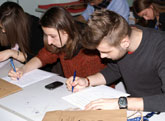 Zenica, 7 February 2013
Zenica, 7 February 2013
Outreach representative Almir Alić today travelled to Zenica in central Bosnia and Herzegovina (BiH) to meet with students of the town's oldest educational institution, the First Gymnasium. Although the conflict in BiH had ended before they were born, the fourth-year students who gathered to listen to Almir speak about the work of Tribunal showed a great deal of interest in the events of the 90s.
Almir’s presentation on international humanitarian law and the ICTY’s role in punishing those responsible for war crimes generated a lively discussion, with the students demonstrating a sharp understanding of the dynamics which are often in play between victims and perpetrators in the process of facing the past. The young people showed an extraordinary ability to identify with the suffering of victims, which they revealed through some of their statements in relation to the Tribunal’s sentencing policy. “I believe that the sentences imposed on convicted war criminals are just symbolic and cannot bring true satisfaction to victims,” one student said.
Others argued that the death penalty is the only proper sanction for certain violations of international humanitarian law. Almir explained that the maximum sentence that could be imposed by the ICTY was life imprisonment. He also discussed some of the various factors that judges take into consideration when determining sentences. Apart from the gravity of the crime in question, the Tribunal’s judges consider a range of mitigating and aggravating circumstances, as well as the general sentencing practice of the courts in the former Yugoslavia. As the discussion evolved, the students were encouraged to think of circumstances that could be considered as mitigating. One student mentioned ‘coercion’, another ‘remorse’, while a third thought that the age of the accused could also be considered a mitigating factor.
With regard to aggravating circumstances, Almir gave examples such as the abuse of positions of authority, circumstances when the victims were particularly young or vulnerable, or criminal acts displaying heightened levels of cruelty.
The principal of the First Gymnasium, Ilijas Hodžić, commended the ICTY for organising such presentations and said Almir was welcome back any time to give additional lectures on similar topics.

